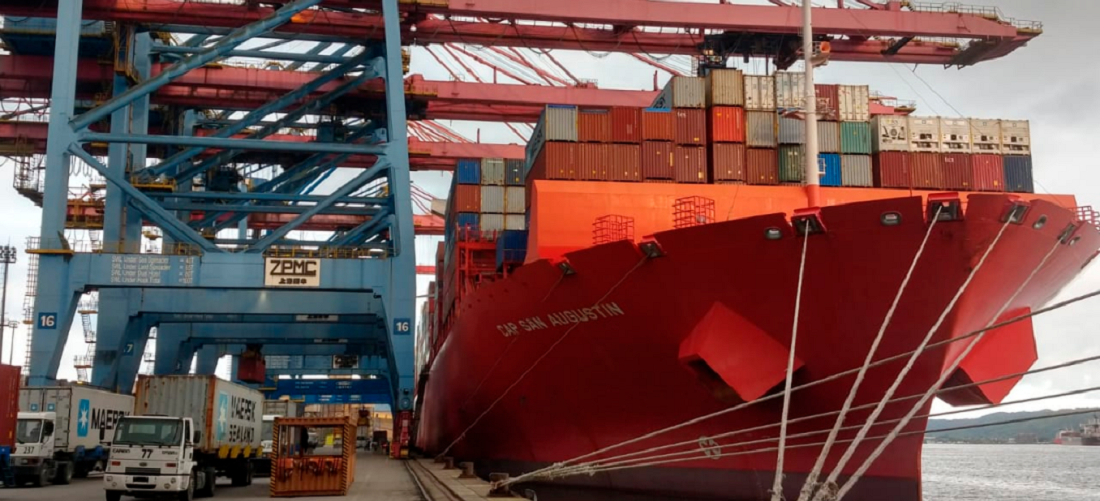
Why shipping giants are buying port terminals in Brazil
Oct, 29, 2024 Posted by Gabriel MalheirosWeek 202443
With just a one-month gap, two of Brazil’s leading container port operators have been bought by global shipping giants. Following CMA CGM’s late-September purchase of Santos Brasil, Wilson Sons announced this week an agreement with Swiss shipping company MSC. This trend, driven by sector verticalization and limited port capacity that raises logistics costs for shipping companies in Brazil, reflects deeper market dynamics, according to experts.
For Wilson Sons, MSC subsidiary SAS Shipping Agencies Services Sàrl has proposed purchasing a 56.47% stake for R$ 4.3 billion. Just last month, CMA CGM acquired a 48% share in Santos Brasil, the largest container terminal operator at the Port of Santos, for R$ 6.3 billion.
Both assets had been on the market for some time, attracting multiple potential buyers. Julio Favarin, founding partner at infrastructure-focused financial advisory Garín Partners, attributes the recent deals to two main factors.
First, shipping freight rates surged post-pandemic, creating a significant cash flow for carriers, enabling them to pursue acquisitions, particularly in port operations.
Locally, Favarin points to the limited availability of port space, a global issue that is even more critical in Brazil. For instance, the Port of Santos, the largest in Brazil and South America, is already operating over capacity, pushing more traffic to alternative terminals, including Wilson Sons facilities in Bahia and Rio Grande do Sul.
This demand-supply imbalance has significantly increased the rates shipping lines must pay to port operators. With no short-term improvement in sight, acquiring port operations is increasingly attractive for carriers.
“Anticipated costs in the coming years make acquisition a smart move,” said Favarin. “If a carrier faces high rates to operate in a third-party terminal, owning its own assets allows greater control and capacity assurance.”
Optimizing Operations
High utilization rates also affect operational predictability, noted Leandro Barreto, managing director at consulting firm Solve Shipping Intelligence. “It’s natural for carriers to want more control over this bottleneck in the supply chain, as a defensive move against capacity shortages,” he added.
Barreto sees sector-wide benefits from such acquisitions. “When carriers make these acquisitions, they bring a strong investment posture and a focus to expand capacity, exactly what Brazil needs,” he said.
Fabrizio Pierdomenico, consultant and former national Secretary of Ports, emphasized that by owning port terminals, shipping lines can maximize returns on both vessel operations and terminal operations. “In theory, verticalization brings scale, reducing costs and boosting terminal competitiveness,” he explained.
With nearly 190 years in the market, Wilson Sons serves over 5,000 clients, including shipping lines, importers and exporters, offshore energy projects, renewable energy sectors, and agribusiness. Its portfolio includes container terminals in Bahia and Rio Grande do Sul, 80 tugboats, 23 Brazilian-flagged offshore support vessels, two offshore support bases in Guanabara Bay (Rio de Janeiro), a customs logistics center in Santo André (São Paulo), and two shipyards in Guarujá (São Paulo).
Santos Brasil operates Tecon Santos, one of Latin America’s largest container terminals, as well as terminals in Vila do Conde, Pará, and Imbituba, Santa Catarina. The company posted revenue of R$ 2.1 billion in the past year, up 10% from 2022.
Vertical Integration and Antitrust Scrutiny
The trend of vertical integration, where the same company acts as both a shipping line and port operator, is a point of contention among experts. While some argue it’s a natural global market trend, critics warn it could reduce competition.
This debate may emerge in Brazil’s antitrust agency CADE’s review of MSC’s acquisition of Wilson Sons and CMA’s purchase of Santos Brasil. Both companies already have stakes in Brazil’s port sector. MSC, for instance, is an indirect shareholder in another container terminal at the Port of Santos, Brasil Terminal Portuário (BTP).
Favarin notes that while it’s difficult to predict CADE’s stance, vertical integration has long been a contentious issue. “Given the importance of vertical integration in the sector, I doubt CADE’s review will be straightforward,” he commented.
Pierdomenico added that while this issue will likely continue sparking discussions, Brazil’s legal and regulatory frameworks are robust enough to prevent anti-competitive practices.
Source: Estadão
-
Ports and Terminals
Jul, 08, 2022
0
Maersk and MSC are back in the competition for Port of Santos area
-
Shipping
May, 21, 2021
0
CMA CGM will apply a general rate increase on the BRAZEX service
-
Shipping
Jun, 17, 2024
0
Crews evacuated from two ships hit by the Houthis
-
Other Cargo
Jan, 20, 2022
0
Brazilian wineries register an increase of 83.25% in exports and sales reach 53 countries

